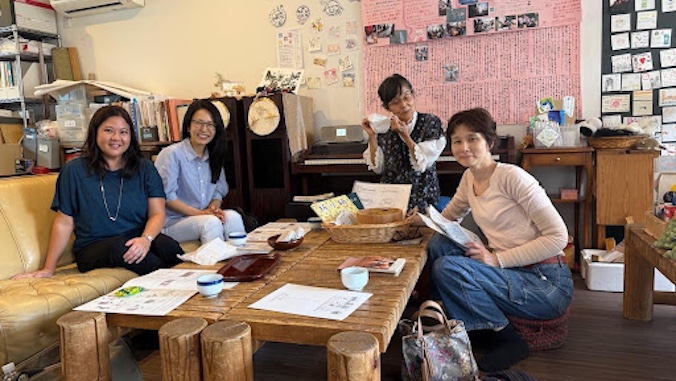Reading time: 2 minutes Christy Nishita and Jinyoung (Jenny) Lee, seated on left, visit Shiba no Ie in Tokyo, Japan.
Christy Nishita and Jinyoung (Jenny) Lee, seated on left, visit Shiba no Ie in Tokyo, Japan.
With aging populations on the rise worldwide, the University of Hawaiʻi at Mānoa’s Center on Aging (COA) is strengthening ties with Japanese researchers to lead the way in gerotechnology and community-based care for older adults.
Gerontologist and then-Interim Director Christy Nishita, and researcher Jinyoung “Jenny” Lee, were invited to the Institute of Science Tokyo for meetings and presentations aligned with the 33rd International Biomedical Engineering Seminar. Their visit builds on a 2023 memorandum of understanding aimed at fostering research and innovation to support older adults in Hawaiʻi and Japan.
During the seminar, Nishita presented the center’s efforts to address dementia care, strengthen the eldercare workforce, and reduce social isolation in Hawaiʻi. Lee shared research focused on food security among the state’s diverse aging population.
Cross-cultural collaboration on eldercare
Their joint presentation, “Critical Eldercare Issues in Hawaiʻi and Opportunities for Collaboration,” emphasized Japan’s experience, where 30% of the population is age 65 or older, as a valuable model for Hawaiʻi, which has the nation’s highest life expectancy.
“The Japanese researchers were interested in how we built these relationships with community members,” Lee said. “Much of their research takes place in the lab, while we do community-engaged studies here in Hawaiʻi.”
Japanese researchers expressed interest in the U.S. eldercare policy landscape, including Medicare and Medicaid, and shared emerging tech-based approaches like robotics, AI and virtual reality. They were also intrigued by the Kupuna Collective, a Hawaiʻi-based network of nearly 300 organizations and 500 members that addresses eldercare through community engagement.
Building age-friendly communities
The visit also included a tour of Shiba no Ie, an intergenerational gathering space introduced to them by Emi Kiyota, founder of the Ibasho movement. Operated by Keio University and the local government, the space offers both structured activities and informal connection to reduce isolation and build community.
“It was a magical experience,” said Nishita. “We saw real potential to adapt this kind of model to our age-friendly work in Hawaiʻi.”
The visit reinforced the Center on Aging’s commitment to building inclusive, supportive communities for older adults across the Asia-Pacific region through shared learning and innovation.
UH Mānoa’s Center on Aging is housed in the Thompson School of Social Work & Public Health.

AloJapan.com